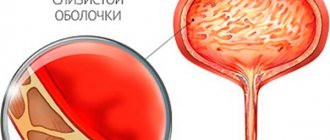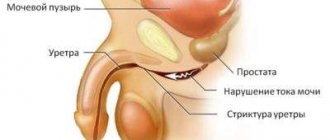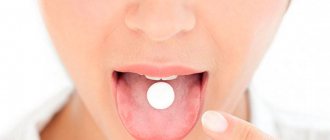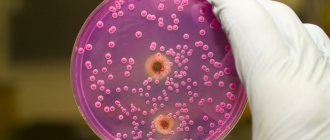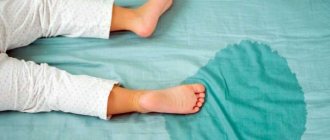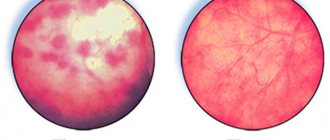In modern urology, inflammation of the bladder associated with infectious damage to its mucous membranes, disruption of the functional activity of the organ and changes in urinary sediment is designated by the medical term “cystitis”. This pathological condition is familiar to many people - the disease especially does not spare women (the reason for this phenomenon is the anatomical features of the urinary tract). Men and children experience symptoms of cystitis much less frequently.
The clinical manifestations of the disease in most cases are pronounced, which allows for timely diagnosis and initiation of effective treatment. Otherwise, the acute form of the pathological process can become chronic, characterized by “blurred” symptoms and regular relapses. Sometimes the slightest violation of personal hygiene rules can provoke an exacerbation of the inflammatory process in the walls of the bladder.
That is why it will be useful for every person to know the main signs of the disease, how to identify and how to quickly cure cystitis.
Symptoms and diagnostic methods
In the acute form, the pathological condition manifests itself several days after infection and is characterized by inflammation of the surface of the bladder walls.
A sick person experiences symptoms such as:
- temperature increase;
- increased urination;
- constant pain in the perineum and lower abdomen;
- general weakness;
- increased fatigue;
- cloudy urine.
Making the correct diagnosis and prescribing quick treatment for cystitis is not difficult for an experienced doctor. However, it is important to remember that the effectiveness and rationality of the course of drug therapy depends on the accuracy of diagnosis. For these purposes, the following diagnostic methods are used:
Medicines for bladder inflammation in women
- general clinical examination of urine with sediment microscopy;
- biochemical blood test for the renal complex;
- bacteriological urine culture;
- clinical blood test;
- specific urine samples according to the methods of Addis-Kakhovsky and Nechiporenko;
- examination of the genital tract;
- Ultrasound of the urinary system;
- cystoscopy (for a chronic form of the disease) - examination of the inner surface of the walls of an organ using a special device.
What products are suitable for children
How to relieve pain from cystitis if a pharmacy is inaccessible or a woman cannot, for some reason, take antibacterial and anti-inflammatory medications?
Drug therapy for cystitis in women at home can be supplemented with folk remedies. Traditional healers who know how to treat cystitis have long compiled effective recipes based on individual herbs and herbal infusions.
Flax seed decoction
To prepare this medicine, you need to place 5 tablespoons of seeds in a saucepan with 1 liter of clean water. Cover the dish with a lid and cook for 30 minutes, stirring regularly. After this, wrap the broth and let it brew for a while. Then it is filtered and poured into a glass vessel.
You need to take 100 ml of this product every 30 minutes, preheating it. The maximum daily dose should not exceed 1 liter. The course of treatment is 3 days.
READ MORE: Inguinal hernia in men treatment without surgery
Traditional Treatments
The main task of effective treatment of the disease is to eliminate the “culprit” of the infection and suppress the inflammatory process.
Acute cystitis can be treated at home, but this process must be under the supervision of a doctor - both adults and children are prescribed:
- Bed rest.
- Diet and drink plenty of fluids.
- Medication course.
- Decoctions and tinctures of medicinal herbs.
- Thermal procedures (heating pads and baths).
The basis for the treatment of bladder inflammation is antibacterial and uro-septic agents
The following medications will help quickly relieve symptoms of cystitis:
- Nitroxoline is an antimicrobial agent intended for the treatment of urinary tract infections. It has an effect on all types of pathogens of the inflammatory process in the bladder: gram-positive bacteria (staphylococci, streptococci, enterococci); gram-negative bacilli (gonococci, Proteus, Escherichia coli); Trichomonas; yeast-like fungi. The drug is taken 2 tablets (100 mg) 4 times a day; in case of severe cystitis, the daily dose is increased to 800 mg.
- Furagin is a bacteriostatic (quickly stopping the proliferation of microorganisms) and has an effect on both gram-positive and gram-negative bacteria. It is taken 2 tablets 3 times a day.
- Furadonin is a broad-spectrum bactericidal drug that causes the death of pathogenic microorganisms. For acute cystitis, take 1 tablet 4 times a day, for chronic cystitis, take 2 tablets before bedtime.
- Palin is an antibiotic with bacteriostatic and bactericidal effects; it is recommended to take 2 capsules 2 times a day.
- Monurel is a natural combination product containing ascorbic acid and cranberry extract. Prevents the proliferation of pathogenic microbes in the bladder and ureters, provides support to the human immune system. Take 1 tablet at night.
- Nevigramon is a uro-antiseptic, characterized by a pronounced antibacterial effect, the recommended dose is 2 capsules 4 times a day.
- Canephron is a combined herbal preparation with antispasmodic, antiseptic and anti-inflammatory properties. Take 50 drops or 2 tablets 3 times a day.
- Rulid is an antibacterial agent that has an effect on many pathogens of infectious processes. To achieve a quick effect, a single dose of 2 capsules (300 mg) is recommended.
The course of treatment for chronic cystitis is aimed at identifying infectious foci in the body and carrying out their effective treatment, restoring the outflow of urine, and preventing relapses of the infectious and inflammatory process
Causes of bladder inflammation
The development of diseases of the genitourinary system can be provoked by various factors:
- hypothermia, cold;
- E. coli existing in the body;
- various genital infections;
- inflammatory phenomena in other vital systems that are chronic;
- intestinal problems, frequent bowel movements.
There are also aspects that can increase the likelihood of developing frequent attacks of cystitis:
- neglect of personal hygiene;
- too active sex life;
- swimming in unsafe bodies of water;
- frequent consumption of unhealthy foods and alcohol;
- a sedentary lifestyle that causes congestion in the pelvic organs;
- overwork, non-compliance with sleep and rest schedules;
- nervous tension, stress.
The listed nuances are not one hundred percent provocateurs of the disease. They only talk about increasing the risks of its development.
Problems with the urinary organs often occur in older people. This is due to hormonal imbalances, a slowdown in metabolism and a decrease in the body's defenses.
Features of the treatment of cystitis in women
The effectiveness of a course of treatment for bladder inflammation depends on the precise identification of the causative agent of the disease. This is necessary because microorganisms quickly get used to the drugs and develop persistent immunity to them. The drug Amoxiclav has a wide spectrum of antibacterial activity. You need to take it 1000 mg 2 times a day, the course of treatment lasts 7 days.
In cases where cystitis needs to be cured quickly, a short-term antibacterial regimen with Monural is used: to stop the proliferation of microbes and the development of the inflammatory process, it is enough to take it for 3 days. Sometimes the drug is taken once at a maximum dose of 3.0 grams before bedtime.
Levofloxacin helps relieve the symptoms of the disease; you need to take it once a day, 250 mg. The action of this medication is targeted and gentle - it can “remove” pathogenic bacteria from the bladder and not disturb the normal microflora.
Acute cystitis goes away without complications in 3 days when using Nolitsin. It is taken 2 times a day, 2 tablets; in case of complicated inflammation of the bladder, the course of treatment is extended to 7 days. However, this fast-acting medicine is contraindicated for pregnant women and nursing mothers.
Herbal remedies will help get rid of cystitis
When the first signs of cystitis appear, phytotherapeutic drugs with an antimicrobial and anti-inflammatory basis - Cyston, Phytolysin, Spasmocystenal - give a good result. In combination with antibacterial therapy, their use will help speed up the healing process.
However, do not forget that some medications against cystitis harm the normal flora of the vagina and intestines. That is why you should opt for those drugs that have minimal effect on the microflora.
How to relieve an attack of cystitis, how to relieve pain?
Cystitis is an inflammatory process of the bladder mucosa, which is accompanied by painful sensations and can lead to serious diseases of the genitourinary system if treatment is not carried out in a timely manner.
How to relieve the pain of cystitis if it is still a while before the doctor arrives, but your health continues to rapidly deteriorate? The condition can be alleviated with simple but very effective measures that have been tested by people and time.
Urgent help
The patient does not yet have time to think about how to relieve the pain of cystitis, and the disease “twists” him so that he cannot lie down, stand up, or move. Once upon a time, the first signs of pathology were ignored, but now they make themselves known repeatedly.
Symptoms of cystitis may subside with indiscriminate use of broad-spectrum antibiotics.
But the disease can be caused by different reasons: in some cases it is provoked by banal hypothermia, and in others by a severe infectious infection or even a cancerous tumor.
Important! Antibacterial drugs should not be taken without receiving the advice of your doctor. In the best case, the patient will get an intestinal disorder, in the worst case, cystitis will “break out” with renewed vigor, and the inflammatory process will spread to neighboring organs and tissues.
The available ways to relieve pain from cystitis quickly without the use of drugs are enough to choose the most effective one. This:
- Warming up the feet for 15-20 minutes (you need to pour hot water into the basin so that the feet can tolerate it and gradually add new portions as it cools).
- Warming up the lower abdomen with the warmth of a hot stone for 20-30 minutes (heat granite or brick, place it in a bucket, sit on it and cover your legs and pelvis with a blanket).
- Using a heating pad or plastic bottles with hot water (warm the lower abdomen, lower back and groin area).
- Using dry heat (heat sand or salt in a frying pan, sleep in a canvas bag, place on the skin covered with a towel).
From these recommendations, it becomes clear how to quickly relieve an attack - heat has a relaxing effect on the body, relieves spasms of the smooth muscles of the bladder, restores blood circulation, and promotes the outflow of stagnant urine.
Available medications
But if the above measures do not help, how to relieve an attack of cystitis that continues to get worse? Antispasmodics and analgesics help reduce pain or get rid of it altogether. Your home medicine cabinet will contain:
- No-Shpa;
- Spasmalgon;
- Analgin;
- Papaverine;
- Ketanov;
- Ketorol (vaginal suppositories);
- rectal suppositories with Diclofenac.
Cystitis, as a manifestation of inflammation, causing pain and muscle spasm, weakens the “grip”. The patient begins to feel the pain gradually decrease.
The amplitude of movements increases, there is no feeling of cutting or burning when urinating. But you need to understand that this is a temporary relief of the condition.
Pain from cystitis will not fail to return with a vengeance, so after taking the pills you should definitely consult a doctor.
What to do when diagnosed?
The patient may suspect he has cystitis and already roughly knows how to quickly relieve pain, but the benefits of his actions are noticeable if the diagnosis has been confirmed by a specialist.
A sharp attack of pain is not always caused by hypothermia, alcohol, physical overload, or consumption of spicy and spicy foods.
It can be triggered by viruses, pathogenic bacteria, concomitant diseases of the kidneys or genitourinary system.
In this case, the doctor prescribes antibacterial drugs, which include:
- Furadonin;
- Nolitsin;
- Monural et al.
Each of these medications relieves acute pain by providing anti-inflammatory, diuretic effects and destroying foreign microorganisms. Solving the problem of how to relieve an attack of cystitis takes 3-4 days, if the doctor’s requirements are strictly followed, and the medication is taken strictly according to the specified regimen.
Important! When using these remedies, you should not limit yourself to water, worrying that this may cause pain due to cystitis, which even effective medications cannot relieve. On the contrary, thanks to the timely outflow of urine, the functions of the bladder are gradually restored. In this case, some of the bacteria are washed out along with the liquid.
General recommendations
The urologist will explain to the patient in detail how to relieve an acute attack of cystitis and prescribe a course of treatment. This will help you forget about the attacks and remove disturbing symptoms. But bad habits, an unhealthy lifestyle, excess food, and alcohol consumption will return everything “to normal.” How to get rid of pain forever? To do this you need:
- Avoid “heavy” and unhealthy foods, hot seasonings and sauces.
- Dress for the weather.
- Avoid exposure to drafts.
- Observe personal hygiene rules.
- Ensure timely emptying of the bladder.
Important! An alarming sign is the appearance of blood in the urine. You should consult a doctor immediately. During the period of exacerbation of the disease, you should not take hot baths, be in the sun, or visit baths and saunas.
Following these useful recommendations, if it does not completely protect you from the disease, will significantly reduce the severity of symptoms. If you follow a sleep and rest schedule, eat properly, and avoid harmful addictions, the immune system gives a powerful rebuff to pathogenic bacteria.
Bottom line
Please pay attention to the following points:
- An attack of cystitis can be caused by ordinary hypothermia or indicates a severe concomitant illness. You can't joke with either one.
- First measures for acute pain: bed rest and heat treatment.
- If the pain intensifies, you should take an antispasmodic or analgesic.
- Antibacterial drugs are prescribed by a doctor. You cannot take medications from this group without his instructions.
- A healthy lifestyle is a powerful defense against cystitis.
The body uses hidden reserves and independently gets rid of many “sores,” including cystitis. On the other hand, potent drugs will not provide effective help if the patient ignores compliance with simple requirements and continues to live as before. By his actions, he brings closer the moment when an unpleasant diagnosis will be made.
The essence of the article:
- Urgent care for cystitis is to provide the patient with rest and warm the sore area. This will remove muscle spasm and restore blood circulation to the sore area.
- If there is no effect, painkillers from the home medicine cabinet are used. These are proven drugs that have a wide range of applications. They affect pain receptors, reducing the conduction of nerve impulses. Antispasmodics relax the muscles of the bladder, reducing pain.
- When diagnosed with bacterial cystitis, it is recommended to use medications that destroy the infection. They are prescribed by the attending physician.
- People who lead a healthy lifestyle are less susceptible to cystitis.
Source: https://domurolog.ru/voprosi/kak-snjat-simptomy-cistita.html
How is the disease treated in men?
Inflammation of the bladder in men most often develops as a result of violations of hygiene rules. This disease occurs especially often after staying near bodies of water. Before prescribing treatment, urologists conduct a special microbiological study to accurately determine the “culprit” of the infection. After the analysis, the following is prescribed:
- Nitroxoline is an antimicrobial and antifungal agent;
- Monural is a modern, fast-acting drug;
- Palin is an antibiotic that has an effect on any pathogenic microorganism;
- Canephron is a herbal preparation that helps relieve pain during urination;
- Monurel - its main component is cranberry, necessary for cystitis.
For the treatment to be effective, along with taking medications, men need to exclude smoked, salty, spicy and sour foods from their diet.
In order to stop an attack of pain in the lower abdomen, you can take No-shpa, which can relieve spasm of the bladder muscles.
Men do not really like to be treated, but it is important for them to understand that untreated cystitis has fatal consequences - the infectious process can affect the kidneys and cause the development of acute renal failure.
Dangerous conditions
In most cases, it becomes clear that you have cystitis in the first 24 hours. But if the condition worsens sharply, you should immediately consult a doctor.
The following conditions are dangerous from the point of view of self-medication of cystitis:
- blood appears in the urine for a long time. A small amount may, in principle, be characteristic of cystitis, but profuse hematuria requires immediate detailed diagnosis;
- pregnancy;
- age over 65 years;
- presence of high fever, vomiting;
- severe pain in the lower back;
- a previous episode of urolithiasis or other kidney diseases;
- diabetes;
- frequently recurring cystitis;
- Signs of cystitis in children require mandatory consultation with a doctor.
Cystitis is a problem not only for women, although it is more common among the weaker sex due to the peculiarities of the anatomical structure. In men, cystitis is more likely to develop with age, when the immune system weakens and the infection enters through the ascending tract from the prostate gland, testicles or urethra. Stagnation of urine also plays an important role when the prostate enlarges and the urethra is compressed.
Is it possible to cure without antibiotics?
Antibacterial drugs are contraindicated for some patients. This category includes people with allergic reactions, pregnant women, children and nursing mothers. In these cases, it is necessary to look for an alternative treatment for cystitis. Herbalists have their own methods that can replace a course of antibacterial therapy. Decoctions of medicinal herbs reduce the inflammatory process and relieve swelling from the tissues of the urinary tract.
Here are some of the most effective options:
- take 1 tbsp. l. bear ears, corn silk, St. John's wort, mix and pour 500 ml of just boiled water, let it brew for 2 hours, strain and take 30 ml 15 minutes before meals;
- A tincture of rowan bark or fruit is very effective - 150 g of raw material is poured into 1 liter of water, boiled for a quarter of an hour, cooled and drunk;
- it is necessary to take decoctions of chamomile, birch leaves, yarrow, licorice root, St. John's wort, coltsfoot, lemongrass every day - it is best to purchase medicinal raw materials in a pharmacy chain and use it according to the instructions;
- rose hips are created for the treatment of urological ailments - they have a mild diuretic, anti-inflammatory and antimicrobial effect;
- Compresses from horsetail decoction will help relieve the feeling of discomfort in the lower abdomen;
- tincture of leaves of lemon balm, motherwort, hops, string, valerian, sage is used for taking warm baths.
A long-standing method of treating cystitis has proven itself well - a sitz bath of hot milk; you can take it daily, for half an hour before bedtime until the symptoms of the disease disappear.
What can be used during pregnancy
The disease often occurs during pregnancy. Antibacterial, antifungal and antiviral drugs may be prescribed to help relieve inflammation. Only a doctor can prescribe treatment and doses that do not harm the fetus. It is strictly forbidden to take sulfonamides and tetracyclines. Chamomile decoction for drinking, bathing and douching helps a lot (the course of treatment should not exceed 2 months).
In case of acute cystitis, paraffin compresses help relieve inflammation and reduce pain. To do this, paraffin must be heated to a temperature of 50°C, applied to the lower back, covered with a towel and a warm blanket. The procedure time is 30 minutes.
